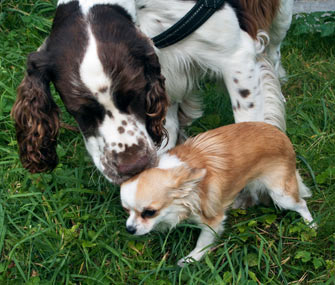Can Little Dogs Live Safely With Big Dogs?
Published on November 29, 2012

Q. I have a 3-year-old Labrador, and I want to adopt a Chihuahua I fell in love with online. The rescue group won’t place little dogs in homes with big dogs; they say it isn't safe. I don’t think that’s fair. What do you advise?
A. I’m not in favor of blanket rules for pet adoptions, and I much prefer shelters and rescue groups that look at each pet and each potential adopter as individuals. That’s because for every rule I’ve heard of, I can easily think of examples I’ve known that are the exception.
Exceptions to the Rules
No dog adoptions without a fenced yard. Tell that to my friends at Good Morning America, true pet lovers who have their dogs in New York City apartments and walk them several times a day.
No adoptions to anyone old enough to be outlived by a pet. Tell that to my mom, Virginia Becker, happy owner of her little dog, Sugar Babe. What if her dog does outlive her? Well, that could happen to any of us, regardless of our age, not just elderly pet owners, and it's why we should all have plans in place “just in case.”
No adoptions to families with toddlers. My granddaughter, Reagan, now 3, has never known a life without animals in it. Nor has my daughter, Mikkel Becker, Vetstreet’s pet-behavior expert, who happens to be Reagan's mother.
Those are real-life examples that I didn’t even have to reach far to find, and I can just as easily come up with dozens more from my larger circle of friends, colleagues, members of our church, people who bring their pets in to one of the two veterinary hospitals where I practice … and on and on.
What About Safety?
Now don’t get me wrong: Thorough screening of adopters is essential to protect the pet and help increase the chances of the next home being the forever one we all hope for when it comes to shelter pets. And good matchmaking is just as important, making sure the pet is a good fit for the family under consideration. Every one of the rules a shelter or rescue group makes was put in place for a reason, and usually because of an adoption gone horribly wrong.
Of course, shelters and rescue groups are fully entitled to make their rules as they want to, but I’m very happy to see many of them starting to move from “rules” to “guidelines” as they work to get more pets and people connected. Guidelines recognize that there can and will be exceptions and allow shelters to focus on the greater interest of getting pets out of shelter cages and runs and onto couches and beds in great new homes.
Which brings me back to your not being allowed to adopt a little dog because you have a big one. Of course, it’s true that a big dog can hurt or even kill a little one, even by accident (little dog-big dog collisions rarely end well for the little dog). And I would bet that this rule is in place because of a past tragedy that the shelter does not want repeated. That doesn’t mean that it necessarily would be repeated if you brought the Chihuahua home with you — your Labrador could be a perfect “big brother” to a little dog. In fact, right now our family includes two big dogs (a Golden and a Labrador Pit Bull mix) and two little ones, and everyone gets along fine.
If you believe your Labrador will be fine with a small dog, it’s worth trying to see if there’s any give in the rules. If you can persuade the shelter to meet your Labrador and judge the factors individually, you may be allowed to adopt the smaller dog. If not, don’t waste your time trying to change the organization: There are lots of dogs who deserve a good home like yours, and you’ll find another good candidate to adopt. Especially if you're looking for a Chihuahua, a popular breed that's over-represented in shelters these days.

